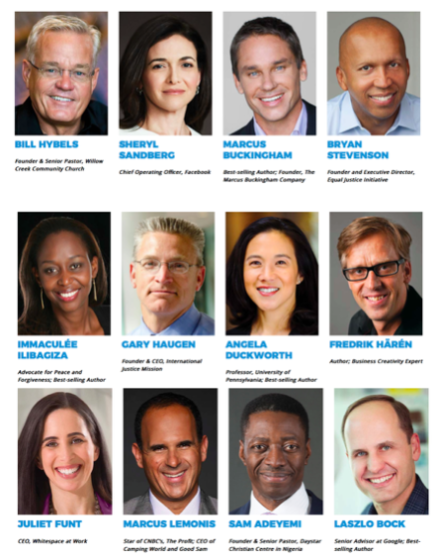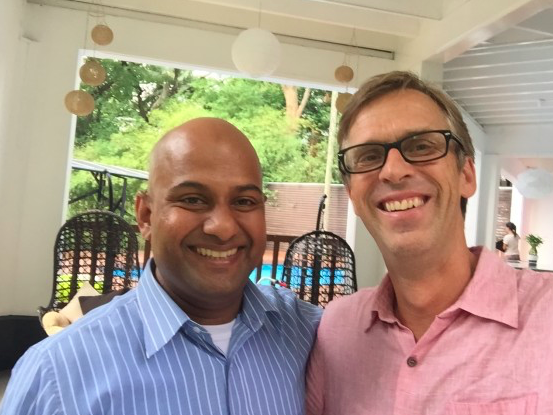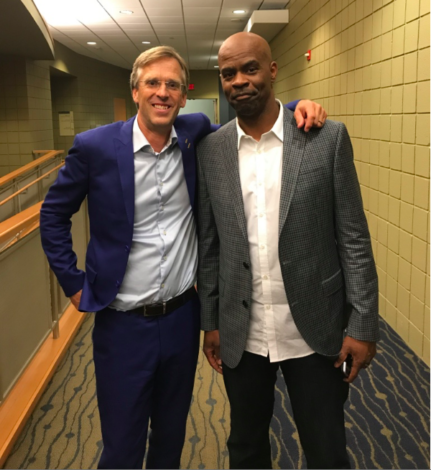Being nervous before or during a speech is one of the biggest, and most common, fears of people around public speaking.
In this post I will try to give some advice on how to make that less of an issue.
First some background.
A few days ago I was in Chicago to speak at what is arguably the largest leadership conference in the world: The Global Leadership Summit
The numbers are staggering:
10 000 people live at the venue.
Broadcast live to150 000 people in 550 venues.
Translated to 60 languages and re-broadcast to an additional 250 000 people in 128 countries, bringing the total attendees to the summit to more than 400 000 people around the world.
The summit has grown every year since it was founded 20 years ago.
The line-up for the 2017 Global Leadership Summit was amazing, as you can see from below.


All world star speakers. And me.
It was a big honor to be part of such a stellar list of speakers.
But as you can imagine, speaking for 400,000 people and sharing the stage with some of the biggest names in speaking, leadership and business can be a bit intimidating. (Imagine failing as a speaker with 400,000 people watching.)
So leading up to the conference, and during the conference I did a few things to reduce the likelihood of me getting nervous – and of me failing as a speaker. And now I will share with you what I did.
1) Prepare.
This might sound obvious, but the best way to not get nervous is to know that you have done everything you can to prepare (If you have done your best you have nothing to fear, but if you know you could have done better you will beat yourself up before, during and after the speech.)
– For this speech I went over my outline about a couple of times per months for over 8 months (I got the confirmation for the speech in December and dedicated myself to mentally go through the speech every other week to be comfortable with it.
– I sent the slides to the organisers in June (even though the conference was in August) just to force myself to be ready with my speech well ahead of the date of delivery.
– I flew in to Chicago 3 days before the event (partly to kill any jetlagg that I might have) and spent those three days in my hotel room, presenting infront of a mirror over and over again.
– I watched at least one YouTube video of every other speaker who was scheduled to speak at the Summit, to see what other speaking styles (and messages) the audience was likely to hear (I think this is a very effective way of preparing for a speech.)
– I made sure I ate, drank and slept very well (hiding the TV-remote in my hotel room, sleeping 10+ hours, taking long walks outdoor, meditating etc – all to be in a very calm and relaxed mindset.
2) Focus on your delivery – not your social media followers
– I made a conscious decision NOT to post any posts on social media like “Here I am getting ready to speak to 400,000 people.” I wanted to stay in the moment and not “in the future”, by not talking about what I was GOING to do, but focus on what I was doing (preparing or delivering a speech.)
3) Feel the room.
They had prepared a private green room for me as a speaker and a VIP seat, but I decided to sit in different places in the 10 000 people auditorium to watch the speakers before me to get a feeling of how the speeches were being perceived from the seats.
4) Understand what comes before and after you.
I made sure I got a few private minutes with the speaker who spoke just before me, “Michael JR”, and right after me, “Bryan Stevenson”, to find out what they were going to communicate so that I could make sure my message fitted well together with them.
5) Get into a state of being “Happitable”.
Happitable is a made up word that I have created.
It is a combination of “happy” and “comfortable”.
If the audience can feel that the person speaking is a) Happy to be delivering the message and b) confident in delivering the message then the audience will love the message, the speaker and the speech.
I find that the best way to get into a “happitable” state of mind is to:
– Watch YouTube videos of your favourite performers when they are “happitable”. (to be inspired)
– Read emails from people who have heard you speak earlier and who’s lives where changed by your speech (to remind you that you are a good speaker who can change lives.)
– Prepare (see above)
– Make it not about you. (Just before I go up on stage I hit myself on the head and repeatedly say: “It’s not about you, it’s about the message, it’s not about you , it’s about the message …” (When you remind yourself that the speech is about the message you are reminded that it is not about you and the reason to be nervous goes away.)
– Be in the moment. (When you are in the moment you are one with the audience which makes it very easy to read them and feel them, which in turn makes it easier to feel what you can and can not say to them.)
Happitble is also the opposite of nervous.
According to the Google “Nervous” means: “easily agitated or alarmed: a sensitive, nervous person. anxious or apprehensive.”
(Side note: the example they use to exemplify being nervous is: “he’s nervous of speaking in public.” …)
When I walked up on the huge stage to speak to 400,000 people I did not feel like I walked up on stage to talk to 400,000 people. I just felt happy and comfortable to share my message to the world.
So how did it go?
Once on stage I felt 0% nervousness. I was comfortable and happy to be there, and I did my best.
At the end of the day Bill Hybels (the founder of The Global Leadership Summit) went up on stage and said: “I think you will agree with me, that this might just have been the strongest opening day of the summit ever.”
Considering the list of speakers they have had over the years (Jimmy Carter, John Maxwell, Jim Collins, Carly Fiorina, Tony Blair, Daniel Pink, Jack Welch, Melinda Gates, and Brene Brown to name a few) that is no small feat.
And I have to agree. I cannot remember attending a conference with a higher degree of world class speakers in one day.
(I will leave out my own performance as I honestly cannot judge my own performance by itself, or in relation to the other speakers. But I think it is fair to say that I did not, at least screw up 😉
I hope learning from my experience will help you the next time you get a chance to speak to a large audience and feel that there is a risk that you might get nervous.



